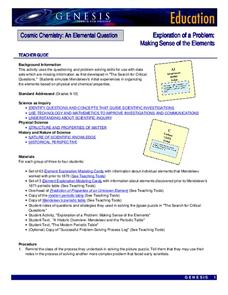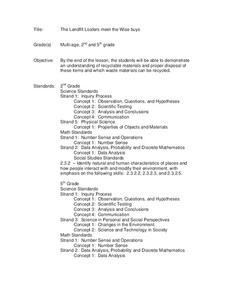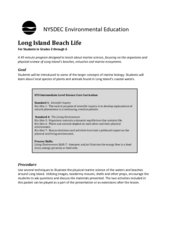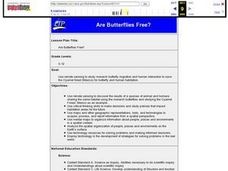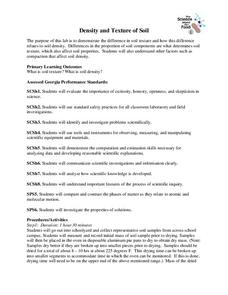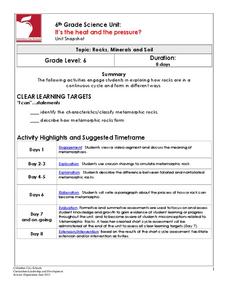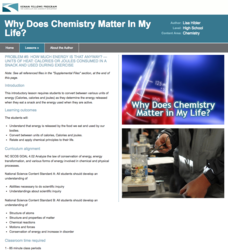Curated OER
Aquatic Science
What a terrific way to explore the pond habitat! Learners discuss the animal and plant life found in the Long Island area. They also discuss vocabulary terms, identify pollution concerns, and resource conservation.
Curated OER
Disguise for the Eyes
Young scientists discover how many, many animals use color as a way of helping them to survive in the wild. They understand how animals use color in their everyday lives. Pupils engage in hands-on activities, watch videos, access...
NASA
Tools of the Trade
Did you know every state in the U.S. has at least one observatory? During the lesson, scholars research the cost of building and maintaining an observatory. They must present their information in a proposal to build a new observatory,...
NASA
Exploration of a Problem: Making Sense of the Elements
When given too much data to simply memorize, it helps to sort it into manageable groups. The second lesson in the six-part series of Cosmic Chemistry challenges groups of pupils to take a large amount of data and figure out how to best...
Curated OER
Sink or Float
Second graders explore floating and sinking and make predictions about whether certain objects are likely to sink or float. They read the story Who Sank the Boat? by Pamela Allen. Pupils loacate rhyming words and discuss the events of...
Kenan Fellows
How Much Heat Can a Phase Change Produce?
Scholars learn about heat release in phase changes. They perform calculations as they compare and contrast a science fiction passage and a home heating application.
Curated OER
The Landfill Loafers Meet the Wise Buys
Students discover recyclable materials and the proper disposal of those items through Internet research. Working in groups of four, they search the Internet for uses of recyclable materials. After research is complete, they participate...
Curated OER
The Five Classes of Vertebrates
What a terrific lesson! Learners discuss the animal kingdom, and classify them as vertebrates and invertebrates. They also identify them as fish, amphibians, reptiles, birds, and mammals. There is even a taxonomic breakdown of popular...
Curated OER
Long Island Beach Life
Have your class learn about marine life through this resource. This comprehensive lesson has learners discuss marine life, learn key vocabulary, discuss environmental concerns, and play games related to migration and predator/prey...
Curated OER
Are Butterflies Free?
Students use remote sensing to study monarch butterfly migration and human interaction to save the Oyamel forest (Mexico) for butterfly and human habitation.
Sea World
Endangered Species
Study different endangered species with several activities that incorporate math, science, language arts, and research strategies. A great addition to your lesson on conservation or Earth Day.
Sea World
Ocean Discovery
Immerse your young marine biologists in the world of marine animals. The lesson includes several activities that are age-appropriate for preschoolers and kindergartners, including coloring pages, gluing feathers and sand onto paper...
Sea World
Marine Animal Husbandry and Training
Step into the role of a zoo director with several activities about animal training and running a zoo. Kids calculate the amount of food each animal needs, design a habitat for penguins, decide how to breed bottlenose dolphins, and train...
University of Colorado
Using Spectral Data to Explore Saturn and Titan
Saturn's rings are made of dust, ice, and solid chunks of material. Individuals use spectrographs in this final installment of 22 lessons to determine the atmospheric elements. They analyze spectrums from Titan's atmosphere and Saturn's...
NASA
What's the Frequency, Roy G. Biv?
While all light travels at the same speed, each color in the visible light spectrum contains a different wavelength and frequency. Scholars determine the relationship between frequency and wavelength as they complete the activity. They...
Curated OER
Perceived Risks
Learners rank a list of everyday risks to compare with classmates. They rate each risk on both its ability to be controlled and its observability in the environment. Results are graphed.
Curated OER
What's The Big Deal About Accutane?
Students take on the role of epidemiologists. They investigate an "outbreak" in serious birth defects that occur in infants born to teenage girls. students discover a link between the use of the acne drug called Accutane and birth defects.
NASA
Newton Car
If a car gets heavier, it goes farther? By running an activity several times, teams experience Newton's Second Law of Motion. The teams vary the amount of weight they catapult off a wooden block car and record the distance the car...
Curated OER
In Touch with Apples
Students read "How To Make an Apple Pie and See the World", the story of a girl who traveled the world to find the ingredients to make her apple pie. They conduct a series of interdisciplinary activities including testing their senses,...
University of Georgia
Density and Texture of Soil
All soil is not created equal! A lab activity asks learners to collect and analyze soil. Specific calculations determine the amount of sand, silt, and clay in a sample and allow individuals to identify the soil texture.
Columbus City Schools
It's the Heat and the Pressure?
Ready for a change? Give a comprehensive collection of metamorphic materials a try! With the assortment of printables and lab activities, you won't be under pressure to keep things lively. The unit culminates by having pupils complete an...
Kenan Fellows
What Is Heat?
If objects have no heat, how do they can gain and lose it? Scholars experiment with heat, temperature, and specific heat of various substances. They create definitions for these terms based on their own conclusions to complete the fourth...
Kenan Fellows
How Much Energy Is That Anyway?
The fifth lesson in the six part series introduces units of energy including calories, Calories, and joules. Scholars determine the energy released when eating a snack and during activity.
Education Outside
Papermaking
Imagine recycling food scraps and using them to make paper. The directions are all here in a seven-page packet that details several paper-making strategies.





